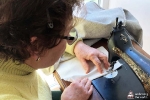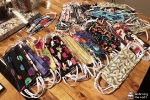“I really was just this person in between who spontaneously made a video and then it took its own course,” says Aparna. “Since Amma was already telling us to wear masks here, her children in the world also wanted to do the same.”
Word soon spread and by the end of March, volunteers from places including the US, Canada, Italy, France, Spain, Finland, Holland, Ireland, Austria and Israel also asked for the instructions. On a global level, volunteers have made more than 40,000 masks.
Gopika is a volunteer with Amma Canada in Toronto. She immediately decided to take up the cause and sew masks for charities there. About 1,000 have been given to a long-term care center, a children’s aid foundation, and downtown respite locations for the homeless.
“It was very touching to see masks being sewn in India and this made me realize the depth of Covid-19’s effect,” says Gopika. “St Felix in downtown Toronto is a charity that Amma Canada has been supporting for more than ten years. When we reached out to them with the masks, they were filled with gratitude.”
Of course, the most essential is medical masks for health workers, people with symptoms of COVID-19, those caring for them, and people with pre-existing health conditions. But alongside that, many governments around the world have suggested wearing cloth masks in public areas, and some have even made it law.
This is because studies have shown that COVID-19 spreads mainly from person-to-person through respiratory droplets produced when an infected person coughs, sneezes, talks, or raises their voice. The droplets can land in the mouths or noses of people who are nearby or be inhaled into the lungs. Also, the virus can be transmitted before symptoms begin, as well as by people who never end up manifesting symptoms.
Dr Isabel Signes Soler is an optometrist in Valencia, Spain who volunteers with Embracing the World. She explains that in her area, many people, both women and men, started making masks as soon as possible.
“I have a friend who was involved at the outset of COVID-19 in helping hospitals obtain homemade masks because there was no other option at that moment,” says Isabel.
“So it was beautiful to see people try to help in any way they can when they have a chance. Now people continue mask-making at home for the community in general. They are so concerned about others and want to do something to try to make a difference.”
In these unprecedented and precarious times, Amma shows through her example how to have the right attitude, both within ourselves and in our actions. Making masks is a way to put into practice her teachings to serve others, despite the fact we are isolated in limited spaces. Each person’s small efforts combine to create a large societal impact.
Photo 1: James Situ holds a box of masks for homeless people in downtown Toronto, Canada's largest city. James is a manager with St Felix Drop-in Centre.
Photo 2: Dr Isabel Signes Soler's mother in full production mode in Spain.
Photo 3: Gopika is with Amma Canada. In the Greater Toronto Area, she led the project to sew 1,000 masks for local charities.
Photo 4: Masks ready for distribution at the MA Center in Ann Arbor, Michigan.








